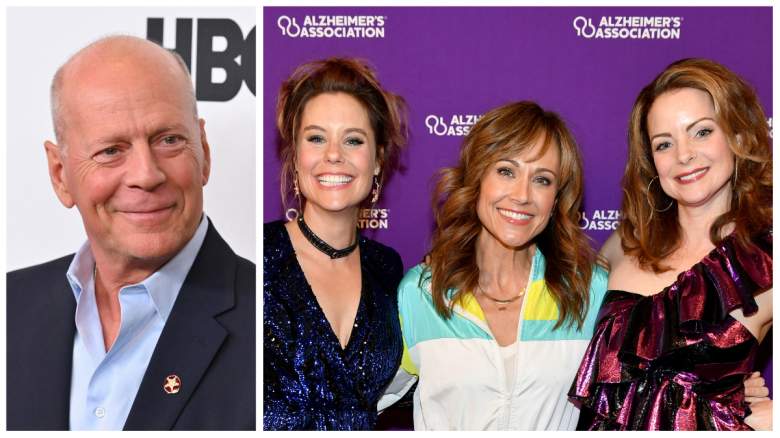
Getty Bruce Willis, and Hallmark stars Ashley Williams, Nikki DeLoach and Kimberly Williams-Paisley
When the wife of actor Bruce Willis disclosed on February 16, 2023, that the movie star received an updated diagnosis amid worsening symptoms, the news hit close to home for several Hallmark stars.
Willis originally had to step away from acting in early 2022 after being diagnosed with aphasia, which, according to a March 2022 Instagram post by his wife, Emma Heming Willis, was “impacting his cognitive abilities.” Nearly a year later, Heming Willis announced in a new post last week that Willis’s condition had worsened, and their family received “a more specific diagnosis” of frontotemporal dementia (FTD).
“Unfortunately, challenges with communication are just one symptom of the disease Bruce faces,” Heming Willis wrote. “While this is painful, it is a relief to finally have a clear diagnosis.”
According to the Mayo Clinic, FTD is “a group of brain disorders that primarily affect the frontal and temporal lobes of the brain” and can change a patient’s personality, behavior, and ability to communicate.
Several Hallmark stars have first-hand experience caring for a family member diagnosed with the devastating disease and offered their sympathy to Willis’s family. Sisters Kimberly Williams-Paisley and Ashley Williams lost their mom in 2016, 10 years after receiving a similar diagnosis. And Hallmark star Nikki DeLoach’s dad was diagnosed with FTD before his death in 2021. All three women have become advocates for families who are facing similar diagnoses.
Here’s what you need to know:
Hallmark’s Williams Sisters Have Been Open About Their Mom’s Hard Journey With FTD

GettySisters Kimberly Williams-Paisley and Ashley Williams in 2019
When People magazine posted news of Willis’ updated diagnosis on its Instagram account, Williams-Paisley commented, “My mom had this too. Sending love to his family” and added six red heart emojis.
According to People, Williams-Paisely and her family learned in 2005 that their mom, Linda Williams, had a form of early-onset dementia called primary progressive aphasia, similar to Willis’s original diagnosis. Linda Williams died in November 2016, not long after Williams-Paisley released a memoir about their family’s journey with dementia, entitled “Where the Light Gets In: Losing My Mother Only to Find Her Again.” The book detailed how the condition changed their mom’s behavior, making her moody, accident-prone, and increasingly unable to recognize her own family.
In 2016, Williams-Paisley told the Association for Frontotemporal Degeneration that her mother had asked the family to keep her diagnosis a “secret,” which made it difficult to seek out potentially helpful information and advice.
“I felt isolated for so much of it,” Williams-Paisley said. “Like we were navigating down a dark road with potholes and dangers at every turn and it was only going to get worse. What do you do when you are told there is no treatment or cure for something? When you are the lab rat doctors need to study because they don’t have the answers? If you are my mother, you hide. I opted for denial.”
The same year, Ashley Williams also opened up about the journey with their mom, writing an emotional essay for People magazine about having to tell their mom she could no longer drive.
“The realization that I had to break my mother’s heart in order to keep her and the community around us safe was one of the most painful moments of my life,” she told People of her decision to write the essay. “I needed to put it down on paper.”
In the years since, the Williams sisters have become vocal advocates for families facing similar diagnoses, hoping to provide others with resources for coping, building community, and finding hope. In November 2022, they teamed up with their brother, Jay Williams, to host the fifth annual “Dance Party To End ALZ,” a 90’s-themed fundraiser that raised a record-breaking $525,000 for the Alzheimer’s Association.
In a press release about the event, Williams-Paisley said, “After losing our mom to Alzheimer’s six years ago, my siblings and I became relentless in our pursuit to advance Alzheimer’s research toward methods of treatment, prevention and ultimately, a cure.”
Nikki DeLoach Says Her Dad’s Journey Through Dementia Was ‘Brutal’
The Williams sisters’ friend and fellow Hallmark star Nikki DeLoach is also a vocal advocate for families and friends of a loved one with dementia, given her own experience with her dad, David, who was diagnosed in 2017 with Pick’s disease, a type of FTD.
The day after Willis’ family announced his new diagnosis, DeLoach posted an Instagram story with a message to his family and friends.
“A diagnosis of FTD is devastating,” she wrote. “This is what my dad had. It’s brutal. My heart goes out to Bruce’s family and friends. I am so sorry. I will be praying for you all.”
Her dad’s steady decline and eventual death in 2021 was life-changing for DeLoach, who has spoken in multiple interviews about her grief and her desire to shed a light on the disease. In a November 2018 essay she wrote for the Alzheimer’s Association, DeLoach described her dad’s condition.
“Dad’s diagnosis of Pick’s disease is very rare and affects the frontal lobe of the brain,” she said. “It is fatal, and very aggressive. This illness completely changes the person. My dad is not the same person he once was. He was my touchstone, my moral compass … the most kind, loving, honest, patient and emotionally available human. I always used to say that he was so calm that he was one step above being asleep all the time.”
DeLoach is also an advocate for the Alzheimer’s Association, teaming up with Ashley Williams to lead the organization’s Walk to End Alzheimer’s in 2022.
“I met Ashley years ago at an acting studio,” DeLoach said in a joint interview with the organization last year. “But the thing that connected us on a very deep level was our shared experience of having parents diagnosed with Alzheimer’s and dementia.”
“We bonded over how we can fight this disease,” Williams continued. “It was Nikki’s idea to join forces for Walk to End Alzheimer’s — she always says we’re better together.”
Dr. David Agus, a CBS News medical contributor, told CBS Mornings it isn’t uncommon for a diagnosis of FTD to take several years from the time the symptoms first appear. Agus described family members who provide care to loved ones with dementia as “underappreciated heroes.”